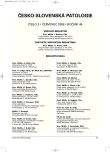-
Medical journals
- Career
On the use of Biochemical Markers in Diagnostics of Sudden Cardiac Death
Authors: J. Šidlo 1; V. Parrák 2; P. Kvasnička 3; M. Majdan 2; H. Šidlová 4
Authors‘ workplace: Institute of Forensic Medicine, School of Medicine, Comenius University and Health Care Surveillance Authority, Bratislava, Slovakia 1; Department of Clinical Biochemistry, Teaching Hospital (workplace Petržalka), Bratislava, Slovakia 2; Department of Nuclear Physics and Biophysics, Faculty of Mathematics, Physics and Informatics, Comenius University, Bratislava, Slovakia 3; Institute of Pathology, Slovak Medical University and Cytopathos, s. r. o., Bratislava, Slovakia 4
Published in: Soud Lék., 53, 2008, No. 3, p. 31-34
Overview
Introduction:
Medical examiners frequently examine victims of sudden death. Most often sudden deaths have a cardiovascular cause. To determine the diagnosis of sudden cardiac death based only on morphological findings may be often very difficult. Measurement of blood concentrations of cardiac troponin I (cTnI) and atrial natriuretic peptide (pro-ANP) is now in clinical use in adult patients with heart failure caused by myocardial damage.Aim:
The aim of the study was the estimation wheather cTnI and/or pro-ANP could be markers of sudden cardiac death.Patients and methods:
The study was carried out on 89 necroptic cases, of which 53 were concluded as cardiac-related sudden death, and 36 cases were used as a control group being other than cardiac death cases. Concentrations of markers were determined in blood taken from the left cardiac ventricle and from the right femoral vein. The dependence between the results of biochemical studies and death causes, results of histopathological examination of myocardium, time interval between the death and taking of samples, and resuscitation data was investigated.Results:
Concentrations of cTnI as determined in blood samples from the left ventricle were in most cases very high, largely exceeding the cut-off level, and so were concentrations of pro-ANP. The values of both parameters were significantly lower in peripheral blood. No statistically significant dependences were found between the levels of the studied markers and the cause of death, myocardial histopathological findings, time interval between the death and taking of samples, and resuscitation data.Conclusion:
Based on the results obtained, the study can be concluded that blood is not a suitable medium for determination of biochemical markers of cardial troponin I and atrial natriuretic peptide for post-mortem diagnostics of myocardial damage and for determining the diagnosis of sudden cardiac death in a manner similar to diagnostics of myocardium damage in living patients.Key words:
sudden cardiac death – morphology - biochemical markers – cardiac troponin I – atrial natriuretic peptide
Sources
1. Adams III, J.E., Dávila-Román, V.G., Bessey, P.Q., Blake, D.P., Ladenson, J.H., Jaffe, A.S.: Improved detection of cardiac contusion with cardiac troponin I. Am. Heart J., 131, 1996, pp. 308-312.
2. Bertinchant, J.P., Polge, A., Mohty, D., Nguyen-Ngoc-Lam, R. et al.: Evaluation of incidence, clinical significance, and prognostic value of circulating cardiac troponin I and T elevation in hemodynamically stable patients with suspected myocardial contusion after blunt chest trauma. J. Trauma., 48, 2000, pp. 924 – 931.
3. Cina, S. J., Thompson, W. C., Fischer, J. R. Jr. et al.: A study of various morphologic variables and troponin I in pericardial fluid as possible discriminators of sudden cardiac death. Am. J. Forensic. Med. Pathol., 20, 1999, pp. 333-337.
4. Edston, E.: Evaluation of agonal artifacts in the myocardium using a combination of histological stains and immunohistochemistry. Am. J. Forensic. Med. Pathol., 18, 1997, pp. 163-167.
5. de la Grandmaison, G. L., Durigon, M.: Sudden adult death: a medico-legal series of 77 cases between 1995 and 2000. Med. Sci. Law., 42, 2002, pp. 225-232.
6. Helm, M., Hauke, J., Weiss, A., Lampl, L.: Cardiac troponin T as a biochemical marker of myocardial injury early after trauma. Diagnostic value of a qualitative bedside test. Chirurg, 70, 1999, pp. 1347 – 1352. (in German)
7. Hu, B. J., Chen, Y. C., Zhu, J. Z.: Immunohistochemical study of fibronectin for postmortem diagnosis of early myocardial infarction. Forensic Sci. Int., 78, 1996, pp. 209-217.
8. Kaplan, E.L., Meier, P.: Nonparametric estimation from incomplete observations. J. Am. Stat. Assoc. 53, 1958, 457-481.
9. Knight, B.: The postmortem demonstration of early myocardial infarction. Med. Sci. Law., 5, 1965, pp. 31-34.
10. Lachica, E., Villanueva, B., Luna, A.: Comparison of different techniques for the postmortem diagnosis of myocardial infarction. Forensic Sci. Int., 38, 1988, pp. 21-26.
11. Leadbetter, S., Wawman, H. M., Jasini B.: Immunocytochemical diagnosis of early myocardial ischemic/hypoxic damage. Forensic Sci. Int., 40, 1990, pp. 171-180.
12. Mazurek, W., Salomon P.: The examination of clinical prognostic importance of atrial and brain natriuretic peptide in patients with acute myocardial infarction. Pol. Merkuriusz Lek. 67, 2002, pp. 15-19. (in Polish)
13. Pérez-Cárceles, M. D., Noguera, J., Jiménez, J. L. et al.: Diagnostic efficacy of biochemical markers in diagnosis post-mortem of ischaemic heart disease. Forensic Sci. Int., 142, 2004, pp. 1-7.
14. Racek, J. et al.: Clinical Biochemistry. Prag, Galén, 2nd ed., 2006, pp. 173-177. (in Czech)
15. R Development Core Team (2007). R: A language and environment for statistical computing. R Foundation for Statistical Computing, Vienna. ISBN 3-900051-07-0, URL http://www.R-project.org.
16. de Vreede Swagemakers, J. J. M., Gorgels, A. P. M., Dubois-Arbouw, W. I. et al.: Out-of-hospital cardiac arrest in the 1990s: a population-based study in the Maastricht area on incidence, characteristics and survival. J. Am. Coll. Cardiol., 30, 1997, pp. 1500-1505.
17. Zar, J., H.: Biostatistical Analysis. New Jersey, Prentice Hall, 4th ed., 1998, pp. 663
Labels
Anatomical pathology Forensic medical examiner Toxicology
Article was published inForensic Medicine

2008 Issue 3
Most read in this issue- Shotgun Gunshot Injury – Shotgun Slugs
- Forensic Toxicological Implication of an Autopsy Case of Mixed Drug Overdose Involving Clomipramine, Chlorpromazine and Flunitrazepam
- On the use of Biochemical Markers in Diagnostics of Sudden Cardiac Death
Login#ADS_BOTTOM_SCRIPTS#Forgotten passwordEnter the email address that you registered with. We will send you instructions on how to set a new password.
- Career

